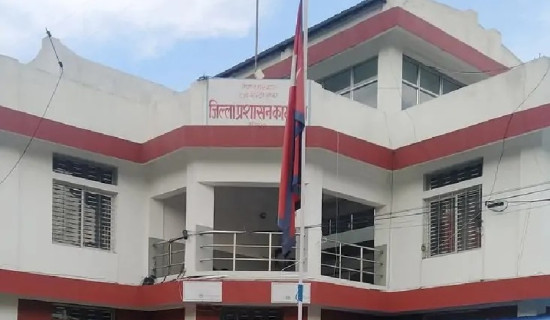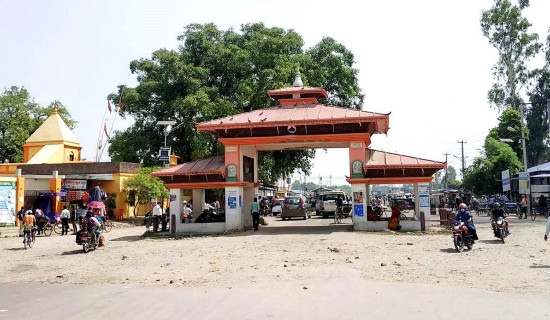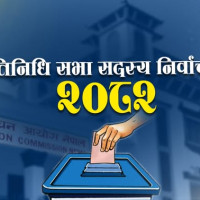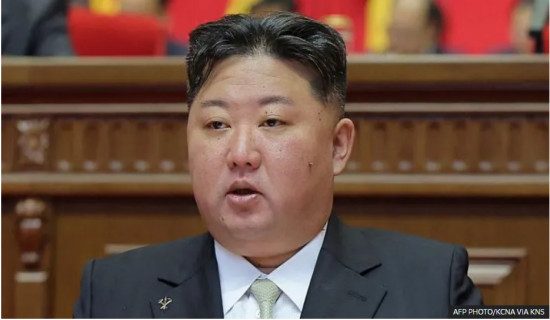- Thursday, 26 February 2026
Karki sworn in as first female PM of Nepal
Kathmandu, Sept. 13: Newly appointed Prime Minister of the Interim Government Sushila Karki has taken the oath of office and secrecy. Former Chief Justice Karki was administered the oath by President Ramchanddra Paudel amidst special function held at the Office of President, Sheetal Niwas on Friday night.
Premier Karki has been given the mandate to hold the next election of the House of Representatives within six months.
“The President, in exercise of the constitutional authority inherent in the office under the Constitution of Nepal, and in order to uphold and protect the Constitution of Nepal as well as to promote national unity, has, on the basis of agreement and recommendation, appointed Sushila Karki as the Prime Minister of the Interim Government with the mandate to conduct the election of the House of Representatives within six months in accordance with the restrictive constitutional provisions vested in the President,” the appointment statement reads.
Following day-long negotiations on Friday, President Ramchandra Paudel administered the oath of office to Karki after political stakeholders agreed to dissolve the House of Representatives.
Who is PM Karki?
Born in Biratnagar in 1950, Karki completed her B.A. from Mahendra Morang Multiple Campus and pursued her Master’s degree in Political Science at Banaras Hindu University in India. After returning from Banaras, she obtained a Bachelor’s degree in Law from Tribhuvan University.
Her journey, which began with advocacy, eventually led her to become the Chief Justice. Even after retirement, her path did not stop, it advanced to becoming the first female Prime Minister. Karki being Nepal’s first female Chief Justice, having led the Supreme Court from June 2016 to May 2017. She is widely recognised as an honest, impartial, and fearless jurist who upheld judicial independence and delivered landmark verdicts.
During her tenure, Karki issued several historic rulings, including granting citizenship rights through maternal lineage, pursuing corruption cases against senior political figures, and directing the arrest of former lawmaker Mohammad Aftab Alam in a high-profile murder case.
Her bold stance against corruption and her insistence on judicial integrity earned her widespread respect, though political forces attempted to impeach her, a move that failed due to strong public support for judicial independence.
Karki is also admired for her simple lifestyle, fearless demeanor, and clean reputation in Nepal’s justice sector. Many credit her with restoring public faith in the judiciary during her leadership.
Within just 11 months of CJ, she delivered verdicts on historic cases. During her tenure, she ruled for the dismissal of then-Chief of the Commission for the Investigation of Abuse of Authority (CIAA), Lokman Singh Karki.
She also sentenced then-Minister for Information and Communications J.P. Gupta to prison on corruption charges. By taking up the executive leadership, she has the opportunity to transform her integrity in the judiciary, her courage against corruption, and her dedication to the nation into new milestones, leaving a lasting mark in history.
PM Karki assumes office
Meanwhile, Prime Minister Karki assumed her office reaching the new building built within Singha Durbar premises meant for housing Ministry of Home Affairs. As the earlier PM Office was set on fire during the two-day protest of GenZ on September 9 evening. The Office of Chief Secretary has also prepared to relocate the office of earlier Ministry of Home Affairs to the old building of the Ministry of General Administration and Federal Affairs after old Ministry of Home Affairs too set on fire by the protestors.
President Congratulates PM Karki, says, save the country
While congratulating PM Karki, President Paudel wished her success in saving the country.
Following the programme, she was also congratulated by Vice President Ram Sahaya Prasad Yadav, Chief Justice Prakash Man Singh Raut, heads of foreign diplomatic missions, the Chief Secretary, other secretaries, and Chief of the Army Staff General Ashok Raj Sigdel along with representatives of the GEN-Z movement.

















